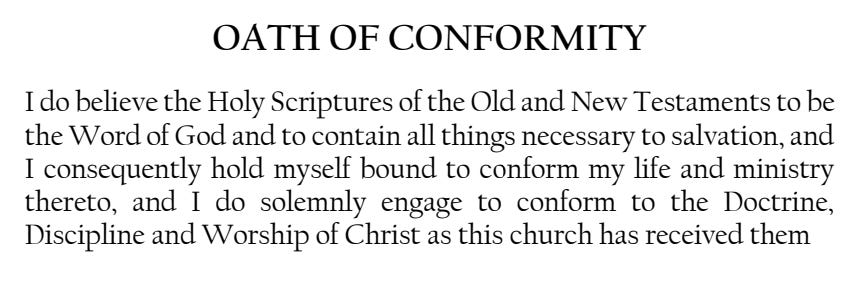MacDonald-specific posts can be found here, and unsubscribed separately from my main newsletter here.
“It is a grand thing to obey without asking questions, so long as there is nothing evil in what is commanded.”
– in Robert Falconer, George MacDonald
When one is ordained as clergy in the Anglican tradition, clergy typically sign two documents; the Oath of Conformity and the Oath of Canonical Obedience.1
In the Oath of Canonical Obedience, the clergyman swears something like “I do swear by almighty God that I will pay true and canonical obedience in all things lawful and honest to the Bishop”
I remember talking with a priest about this, who pointed out that most people fixate on—get triggered by—the word obedience when it is very significantly qualified by the phrase in all things lawful and honest. It is noble to obey in things that have no immoral or dishonest aspect.
I have to admit that these words are challenging: I have experienced bad advice, poor outcomes without support, and (in times past) generally unwise or unhealthy spiritual authority. I think honest, above, speaks to the honesty of the person to whom one is submitting, too. Too often there are poor boundaries, ill-health (mental, spiritual, physical) of the one obeyed that must be put in context of an hierarchal obedience.
This is, of course, asking questions: if not directly, then internally, or even a subconscious analysis of the obedience.
Is it some kind of evil?
Is it contrary Scripture?
Is it contrary to your conscience?
In most cases, it is hard to live without a checklist questions of some kind, even before we get to the self-protective responses of “why can’t you do it yourself” or “I will obey if you convince me.”
What could be meant by “not asking questions?”
The sentence quoted follows with this:
Only grannie concealed her reasons without reason; and God makes no secrets. Hence she seemed more stern and less sympathetic than she really was.
The tragedy in this benevolent hard authority, where questions are not allowed, is because reasons are withheld without reason; God does not do this. His ways are mysterious, and hidden, but there are good reasons for this. Grannie’s secrets kept internal consistency with her perception of God himself (“Her way with Robert was shaped after that which she recognized as God's way with her.”).
MacDonald is arguing something a little more, and far less cynical to the modern mind: it is not a necessary thing to obey without asking questions, or a good thing to have a hard—even if benevolent—authority. I do not think MacDonald is advocating exploitative submission to authority. Rather, I read this as a qualitative statement, reminiscent of a line in Phantastes, “What we call evil, is the only and best shape, which, for the person and his condition at the time, could be assumed by the best good.” It is saying less of the obedience involved—the contingencies, risks, consequences—and more of the quality of the relationship one could have where there is the level of trust between both parties, that one could obey one’s authority—whatever that may be—without questioning, and the other could ask knowing that reasons could—and usually should—be given but remain unnecessary to the obedience itself. At its best, this points to one’s faith—trust—in God the father. That is a grand thing.
{ιμκ☩}
Further Reading: The Rule of St Benedict
Support here helps me work on liturgical projects, which are not small and not approached in haste.





